Constipation is a common digestive system problem that negatively affects the quality of life of many people today. This condition is characterized by decreased frequency of defecation and hardening of the stool and can occur due to many factors. In this article we have prepared for you, we will try to answer all the questions about constipation.
- What Is Constipation?
- Who Is Constipation Common?
- How Common is Constipation?
- A Shared Experience with Manageable Solutions
- Can Constipation Cause Internal Damage or Lead to Other Health Problems?
- Understanding Constipation’s Effects on the Body
- The Potential Health Ramifications
- Mitigating Risks and Promoting Digestive Health
- Prioritizing Digestive Wellness
- What Are The Symptoms Of Constipation?
- Signs of Constipation
- Effects of Constipation on the Body
- How to Get Rid of Constipation?
- What Helps Constipation Fast Naturally?
- How Long Does Constipation Last?
- Does a Warm Shower Help with Constipation?
- How Does it Work?
- Tips for Maximum Benefit
- What Causes Constipation?
- What Are The Symptoms of Constipation in Babies?
- Constipation in Children and Adults
- How to Prevent Constipation?
- What Causes Constipation in Pregnant Women?
- Is Frequent Water Consumption Good for Constipation?
- What Are Useful Foods For Constipation?
- Which Foods Should Be Avoided In Constipation?
- Home Remedies for Constipation:
- Surgical Treatment for Constipation
- Risks and Complications of Surgical Treatment for Constipation
- Constipation Treatment Prices in Turkey
What Is Constipation?
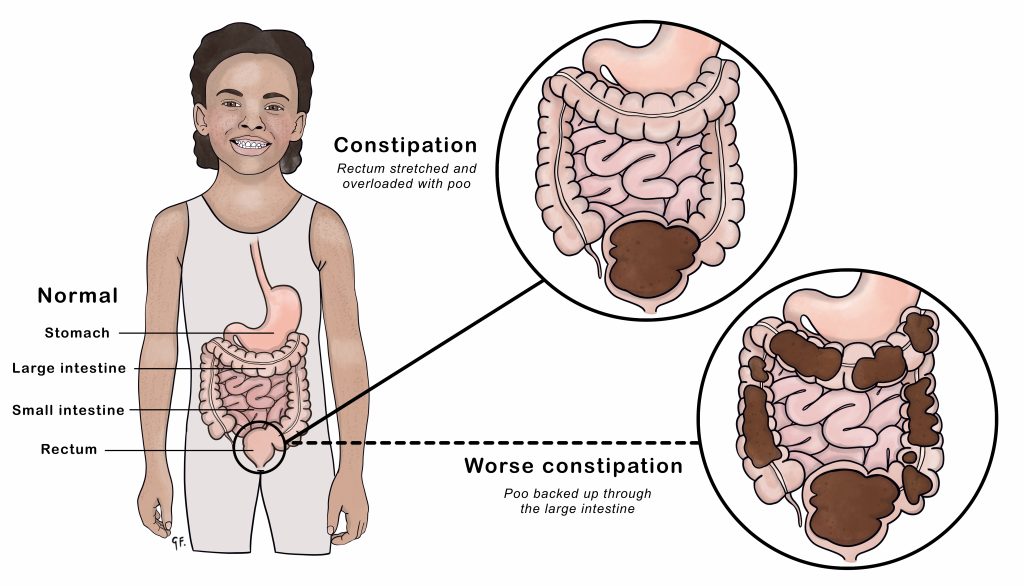
Constipation is a functional disorder of the digestive system. It can be defined as reduced frequency of defecation, hard stools, and difficulty or pain during defecation. Generally, less than 3 bowel movements per week are considered constipation. It can be a temporary condition or a chronic problem and can significantly affect the quality of life.
Who Is Constipation Common?
Constipation can occur in all age groups and genders; however, it is more common in some people. In particular, it is more common in the elderly, pregnant women, and those who lead sedentary lives. In addition, factors such as insufficient fluid and fiber consumption, use of certain medications, and stress can also cause it. Some diseases and disorders of the digestive system, such as irritable bowel syndrome and colon cancer, have been linked to it.
How Common is Constipation?
Constipation is a widespread condition that affects people of all ages and backgrounds. Studies indicate that approximately 16% of the global population experiences symptoms of constipation at some point in their lives1. While occasional constipation is normal and often resolves on its own, persistent or recurrent episodes may require attention.
Global Occurrence: Constipation is a widespread digestive problem that transcends geographical boundaries. Studies suggest that millions of people worldwide encounter constipation at some point in their lives, making it a common and relatable health issue.
Age and Gender Factors: Constipation doesn’t discriminate based on age or gender. It can affect individuals of all ages, from infants to the elderly, and both men and women. However, certain life stages, such as pregnancy and aging, may increase the likelihood of experiencing constipation.
Dietary Factors: A major contributor to constipation is often linked to dietary choices. Low fiber intake, inadequate hydration, and a lack of balanced nutrition can contribute to irregular bowel movements.
Lifestyle Influences: Sedentary lifestyles and a lack of physical activity can disrupt the natural rhythm of the digestive system, contributing to constipation. Regular exercise and an active lifestyle play a vital role in promoting healthy bowel movements.
Medical Conditions: Certain medical conditions, such as irritable bowel syndrome (IBS), hypothyroidism, and neurological disorders, can increase the risk of constipation. Understanding the underlying health factors is crucial in managing and preventing its recurrence.
In conclusion, constipation is a common digestive concern that many individuals encounter. However, the good news is that with proactive lifestyle choices, dietary adjustments, and, when necessary, medical guidance, constipation can be effectively managed. Understanding its prevalence and taking steps toward prevention empowers individuals to lead healthier, more comfortable lives.
Explore our website for more insights on constipation, from its causes and symptoms to practical tips for relief.
Can Constipation Cause Internal Damage or Lead to Other Health Problems?
Constipation is more than just an inconvenience; it can impact your overall well-being. While occasional constipation is common, persistent or severe cases may raise concerns about potential internal damage and associated health problems. Let’s delve into the connection between constipation and its potential impact on your internal health.
Understanding Constipation’s Effects on the Body
Strain on the Intestinal Muscles: Constipation often involves prolonged and excessive straining during bowel movements. This strain can place stress on the muscles in the intestines, potentially leading to discomfort and irritation.
Impacted Stool: Over time, untreated constipation can result in the hardening of stool, leading to impacted feces. This can cause distension of the colon and may contribute to complications such as fecal impaction.
Hemorrhoids: Straining during bowel movements can increase the risk of developing hemorrhoids—swollen and inflamed veins in the rectum or anus. These can cause pain, itching, and discomfort.
The Potential Health Ramifications
Diverticulosis and Diverticulitis: Chronic constipation may be associated with the development of diverticula—small pouches that can form in the walls of the colon. If these pouches become inflamed or infected (diverticulitis), it can lead to more severe complications.
Rectal Prolapse: Prolonged straining can contribute to rectal prolapse, a condition where the rectum protrudes outside the anus. While rare, it underscores the importance of addressing constipation to prevent potential structural issues.
Gastrointestinal Discomfort: Constipation can cause general gastrointestinal discomfort, including bloating, gas, and abdominal pain. If left unmanaged, these symptoms may persist and impact overall digestive health.
Mitigating Risks and Promoting Digestive Health
Hydration and Dietary Changes: Staying well-hydrated and maintaining a diet rich in fiber can help prevent constipation. Fiber promotes regular bowel movements, softening stool and easing the passage through the digestive tract.
Regular Exercise: Incorporating regular physical activity into your routine can stimulate bowel movements and promote overall digestive health.
Medical Consultation: If constipation becomes chronic or severe, seeking medical advice is crucial. A healthcare professional can identify underlying causes and recommend appropriate treatments to alleviate symptoms and prevent potential complications.
Prioritizing Digestive Wellness
While occasional constipation may not pose significant risks, it’s essential to address persistent issues to prevent potential internal damage and associated health problems. Prioritizing digestive wellness through lifestyle adjustments and seeking timely medical advice can contribute to a healthier, more comfortable life.
Explore our website for comprehensive information on constipation, from its causes and symptoms to practical tips for prevention and relief.
What Are The Symptoms Of Constipation?
The symptoms of constipation can vary from person to person; however, the most common symptoms are as follows;
- Fewer than 3 bowel movements per week,
- Stools are hard and dry,
- Difficulty, pain, or discomfort during defecation,
- Feeling incompletely emptied after defecation,
- Abdominal pain, bloating, and gas,
Constipation can often be treated with lifestyle changes and dietary adjustments. Adequate fluid and fiber intake, regular exercise, and stress management are effective ways to prevent and treat this disease. However, when it becomes persistent or occurs in combination with other symptoms, it is important to consult a doctor as it may be a sign of an underlying health problem.
Signs of Constipation
Constipation is a common digestive issue that can affect people of all ages. Recognizing the signs of constipation is crucial for timely intervention and relief. Here are some common indicators that you may be experiencing constipation:
1. Infrequent Bowel Movements: One of the primary signs of constipation is having fewer bowel movements than usual. If you regularly go for several days without passing stools, it may indicate constipation.
2. Straining During Bowel Movements: Difficulty or pain while trying to pass stools is another common symptom. Straining during bowel movements can lead to discomfort and may indicate constipation.
3. Hard or Dry Stools: Stools that are hard, dry, and difficult to pass are characteristic of constipation. Lack of moisture in the stools can make the bowel movement challenging.
4. Incomplete Evacuation: Feeling that your bowels are not empty after a bowel movement is a sign of constipation. This sensation may persist even after making an effort to pass stools.
5. Abdominal Discomfort: Constipation can cause bloating and abdominal discomfort. You may experience cramping or a feeling of fullness in the abdomen.
6. Rectal Bleeding: Straining during bowel movements can sometimes lead to small tears in the anus, resulting in rectal bleeding. If you notice blood on the toilet paper or in the stool, it’s essential to consult a healthcare professional.
7. Changes in Bowel Habits: Any sudden changes in your regular bowel habits, such as a significant decrease in frequency or consistency, should be monitored and discussed with a healthcare provider.
Recognizing these signs early on can help you take proactive steps to manage constipation effectively. If you consistently experience these symptoms, it’s advisable to consult with a healthcare professional for a proper diagnosis and personalized treatment plan.
Effects of Constipation on the Body
Constipation, when left unaddressed, can have various effects on the body that extend beyond mere discomfort. Understanding these potential consequences is crucial for prioritizing digestive health. Here are some of the effects constipation can have on the body:
1. Abdominal Discomfort and Bloating: Persistent constipation can lead to abdominal discomfort, bloating, and a feeling of fullness. The accumulation of stool in the colon can cause distension and discomfort.
2. Hemorrhoids: Straining during bowel movements, a common occurrence in constipation, can contribute to the development of hemorrhoids. These swollen blood vessels around the rectum and anus can cause pain and bleeding.
3. Anal Fissures: Continued straining may result in small tears in the lining of the anus, known as anal fissures. These can cause pain, bleeding, and discomfort during bowel movements.
4. Impacted Stool: Severe or chronic constipation may lead to impacted stool, where hardened feces accumulate in the rectum. This can make it even more challenging to have regular bowel movements and may require medical intervention for removal.
5. Compromised Bowel Function: Over time, constipation can affect the normal functioning of the bowel. The muscles in the colon may become less responsive, making it difficult for the intestines to propel stool efficiently.
6. Nutrient Absorption Issues: Prolonged constipation may interfere with the absorption of nutrients in the colon. This can impact overall digestive health and potentially lead to nutritional deficiencies.
7. General Discomfort and Fatigue: The discomfort associated with constipation can extend beyond the abdominal region, causing a general sense of malaise and fatigue. This is often a result of the body’s efforts to cope with the challenges of an irregular bowel movement.
8. Compromised Quality of Life: Chronic constipation can significantly impact a person’s quality of life. It may lead to anxiety about bowel movements, affect social activities, and contribute to overall feelings of frustration and discomfort.
It’s essential to address constipation promptly through lifestyle modifications, dietary changes, and, if necessary, medical interventions. If you experience persistent constipation or severe symptoms, consult with a healthcare professional for personalized advice and treatment options.
How to Get Rid of Constipation?
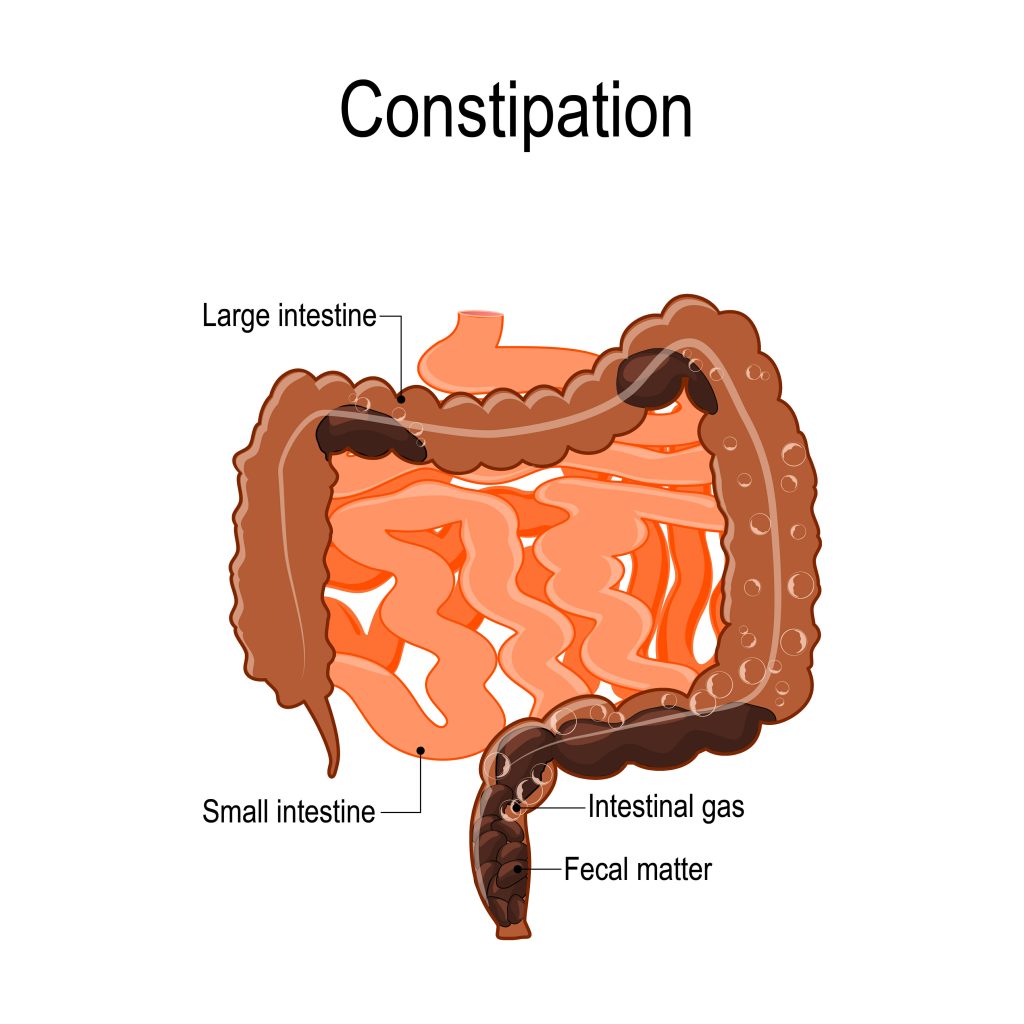
Constipation can be an uncomfortable and frustrating condition that affects millions of people worldwide. It occurs when bowel movements become infrequent or difficult to pass, leading to discomfort, bloating, and abdominal pain. If you’re wondering, “How do I get rid of it?” There are several strategies you can try to find relief.
One of the most effective ways to relieve it is by increasing your fiber intake. Fiber adds bulk to your stool, making it easier to pass through the digestive system. Foods rich in fiber include fruits, vegetables, whole grains, and legumes. Additionally, drinking plenty of water throughout the day can help soften the stool and promote regular bowel movements.
Regular exercise can also play a significant role in alleviating it. Physical activity stimulates the muscles in your intestines, helping to move stool along more efficiently. Engaging in activities like walking, jogging, or yoga can be beneficial in promoting regular bowel movements.
Another approach to treating it is to establish a consistent bathroom routine. Try to visit the restroom at the same time each day, preferably after a meal. This can help train your body to have regular bowel movements.
If these lifestyle changes don’t provide relief, over-the-counter laxatives or stool softeners may be an option. However, it’s important to consult with a healthcare professional before using these medications long-term, as they can cause dependency and other side effects.
In conclusion, finding relief from it involves a combination of dietary and lifestyle changes. By increasing fiber intake, staying hydrated, exercising regularly, and establishing a consistent bathroom routine, you can effectively manage and potentially eliminate it. However, if symptoms persist or worsen, it’s crucial to seek medical advice for a proper diagnosis and personalized treatment plan.
What Helps Constipation Fast Naturally?
Constipation is a common digestive issue that affects millions of people worldwide. It occurs when bowel movements become infrequent or difficult to pass. While there are various over-the-counter remedies available, many individuals prefer natural solutions to alleviate it quickly.
One effective method to relieve it naturally is to increase fiber intake. Fiber adds bulk to the stool, making it easier to pass through the digestive system. Foods rich in fiber include fruits, vegetables, whole grains, and legumes. Incorporating these into your diet can help regulate bowel movements and promote regularity.
Hydration is another crucial aspect of preventing and treating constipation. Drinking an adequate amount of water throughout the day softens the stool, making it easier to pass. Aim to drink at least eight glasses of water daily and avoid excessive consumption of dehydrating beverages such as alcohol and caffeine.
Regular exercise also plays a significant role in maintaining healthy digestion. Physical activity stimulates the muscles in the intestines, promoting bowel movements. Engaging in activities such as walking, jogging, or yoga for at least 30 minutes a day can help relieve constipation.
Additionally, certain natural remedies can provide fast relief from constipation. Herbal teas like peppermint, ginger, or chamomile have soothing properties that can aid digestion and alleviate it. Consuming a tablespoon of olive oil or flaxseed oil can also lubricate the intestines, easing the passage of stool.
While these natural remedies can be effective, it is important to consult a healthcare professional if it persists or becomes chronic. They can provide further guidance and recommend appropriate treatments based on individual needs.
How Long Does Constipation Last?
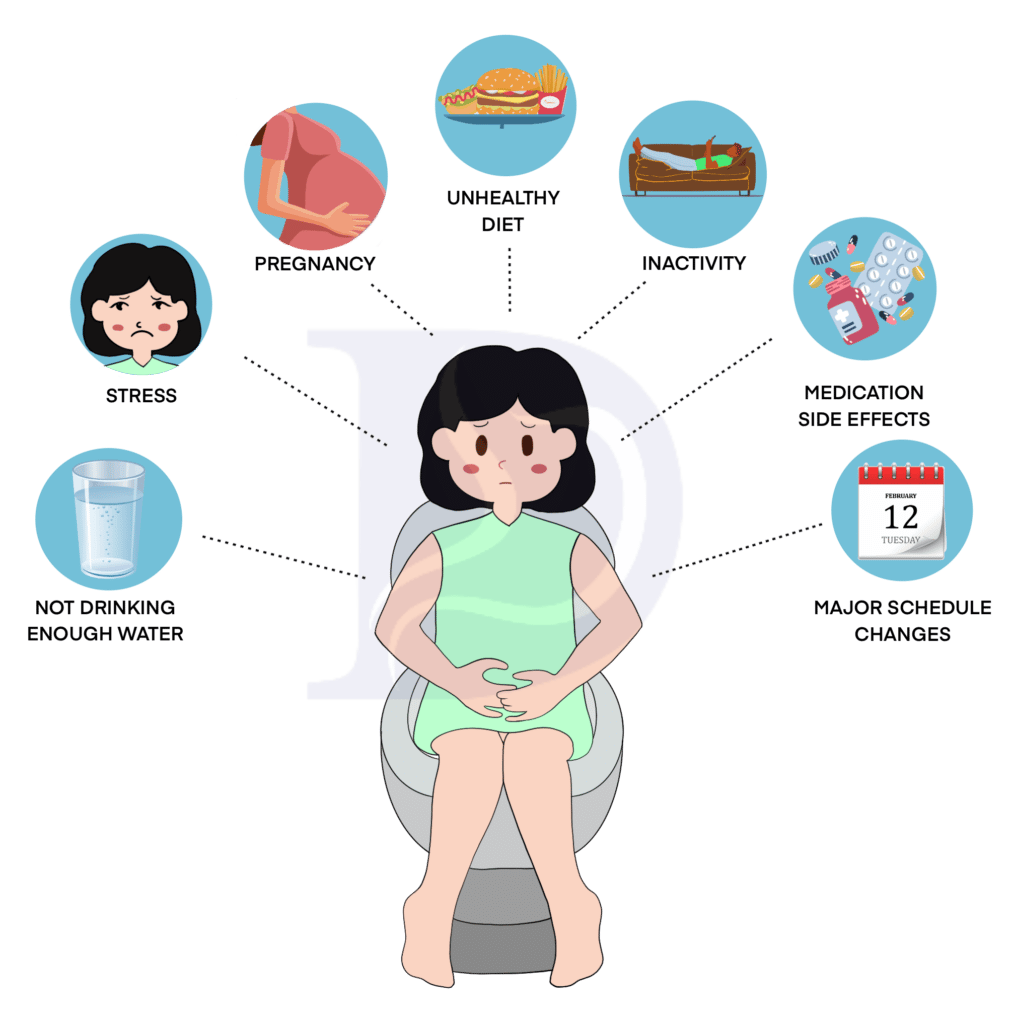
Constipation is a common digestive issue that affects millions of people worldwide. It occurs when bowel movements become infrequent or difficult to pass. Many individuals wonder, “How long does it last?” The duration can vary from person to person and depends on several factors.
In most cases, it is temporary and resolves within a few days. Lifestyle factors such as a lack of fiber in the diet, inadequate water intake, and a sedentary lifestyle can contribute to its onset. Making simple changes like increasing fiber intake, staying hydrated, and engaging in regular physical activity can often alleviate constipation in a short period.
However, chronic it, lasting for several weeks or even longer, may require medical intervention. Underlying health conditions, such as irritable bowel syndrome, hypothyroidism, or certain medications, can contribute to prolonged it. In such cases, it is crucial to consult a healthcare professional for proper diagnosis and treatment.
Moreover, age can also influence the duration of constipation. Older adults may experience longer-lasting it due to age-related changes in the digestive system. They should seek medical advice if constipation persists for more than a few days, as it can lead to complications like fecal impaction or hemorrhoids.
In conclusion, the duration of it varies depending on individual circumstances. While most cases resolve within a few days through lifestyle modifications, chronic constipation may require medical attention. It is essential to listen to your body, maintain a healthy lifestyle, and seek professional help if constipation persists or becomes a recurring issue.
Does a Warm Shower Help with Constipation?
If you’re dealing with constipation, you might be exploring various methods to find relief. One unconventional yet surprisingly effective approach is taking a warm shower. While it may not be a cure-all, a warm shower can offer some relief and contribute to your overall well-being.
How Does it Work?
A warm shower can help in several ways:
- Muscle Relaxation: The warm water helps relax the muscles in your abdomen, including those in the gastrointestinal tract. This relaxation may ease the passage of stool and reduce the discomfort associated with constipation.
- Stress Reduction: Stress can contribute to digestive issues, including constipation. A soothing warm shower can promote relaxation, reducing stress levels and potentially aiding in better digestion.
- Stimulation of Blood Flow: The warmth from the shower can promote increased blood flow to the abdominal area. Improved blood circulation can be beneficial for digestive processes.
Tips for Maximum Benefit
- Adjust the Temperature: Ensure that the water temperature is comfortably warm, not too hot. Extremely hot water might have adverse effects and lead to dehydration.
- Take Your Time: Allow yourself to enjoy the shower for an adequate amount of time. A leisurely shower session can enhance the relaxing effects.
- Combine with Other Remedies: While a warm shower can be a helpful addition, it’s essential to maintain a balanced diet, stay hydrated, and engage in regular physical activity for comprehensive constipation management.
What Causes Constipation?
Constipation is a common digestive system problem that occurs when bowel movements slow down and stools become hard. The causes of it include lifestyle, eating habits, and some medical conditions. The causes of it can be briefly listed as follows;
- Insufficient fiber consumption
- Insufficient water consumption
- Sedentary lifestyle
- Some medicines
- Stress
- Pregnancy
- Medical conditions
What Are The Symptoms of Constipation in Babies?
Constipation in infants is common, especially during the transition to solid foods. Symptoms of it in infants are as follows;
- Decreased frequency of defecation,
- Hard and dry stools,
- Painful defecation
- Gas and bloating,
- Loss of appetite
- Abdominal stiffness
Constipation in Children and Adults
Constipation in children and adults usually occurs due to lifestyle and eating habits. The symptoms of it in children and adults can be explained as follows;
- Defecation less than 3 times a week is considered a sign of it.
- In case of it, the stool is hard, dry, and difficult to pass.
- Pain and feeling of difficulty during defecation are signs of it.
- The feeling that the intestines are not completely empty after defecation is a sign of it.
- Gas accumulated in the intestines due to it can cause abdominal pain and bloating.
- In some cases of severe it, the need to pass stool by hand may occur.
To prevent it, it is important to drink enough water, eat a fiber-rich diet, and exercise regularly. It is also important to treat medications and medical conditions that cause constipation.
How to Prevent Constipation?
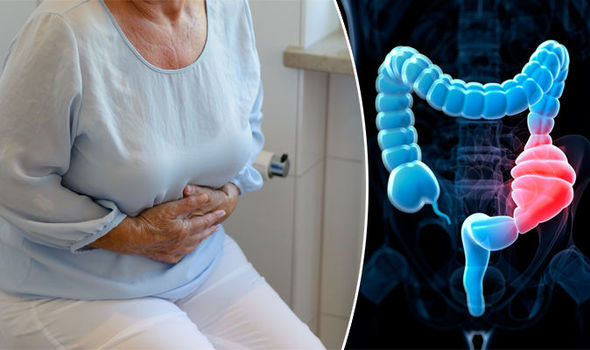
Constipation is defined as irregular bowel movements and difficulty in defecation. It is an uncomfortable condition that reduces quality of life and increases stress levels. Some methods that can be applied to prevent it can be briefly explained for you as follows;
- Consume Fiber Foods (At least 25 grams)
- Increase Water Consumption (At least 8 glasses a day)
- Regular Physical Activity and Exercise
- Review Your Toilet Habits
- Avoid Stress
What Causes Constipation in Pregnant Women?
During pregnancy, hormonal changes in the body and the pressure exerted on the intestines by the growing uterus can cause constipation. In addition, iron supplements and changes in eating habits are also among the causes of it in pregnant women. To prevent it during pregnancy, it is important to drink enough water, consume fiber-rich foods, and do regular physical activity.
Is Frequent Water Consumption Good for Constipation?
Yes, frequent water consumption is good for it. Water softens the stool, regulates bowel movements, and facilitates defecation. Drinking at least 2-2.5 liters of water a day helps prevent constipation. It is also important to avoid drinks with dehydration risks, such as caffeine and alcohol.
What Are Useful Foods For Constipation?
Constipation is defined as irregular bowel movements and difficulty in defecation. This is a problem that reduces the quality of life and causes discomfort. Nutrition plays an important role in the prevention and treatment of it. Useful foods for this disease are as follows;
Fiber-rich foods help regulate bowel movements and soften the stool. For this reason, those who suffer from it should add enough fiber-containing foods to their daily diet. Fibrous foods include whole wheat bread, oats, barley, legumes, vegetables, and fruits.
Fruits that are good for this disease include prunes, figs, apricots, and pears. When consuming these fruits, consuming them unpeeled as much as possible provides a higher fiber intake.
Vegetables that help relieve this disease include spinach, broccoli, celery, carrots, and zucchini. Consuming these vegetables in boiled, steamed, or sautéed form benefits the digestive system.
Adequate water consumption helps regular bowel movements and prevents this disease. Care should be taken to consume at least 2 liters of water a day. You can also consume liquids such as herbal teas, buttermilk, and compote.
Probiotics support the digestive system by regulating the intestinal flora and help prevent this disease. Foods containing probiotics such as yogurt, kefir, pickles, and sauerkraut can be consumed.
Which Foods Should Be Avoided In Constipation?
In order to prevent and treat constipation, it may be necessary to restrict or completely stop consuming certain foods. Foods that should be avoided in constipation can be explained as follows;
Processed foods can trigger constipation because they are low in fiber and rich in additives. Therefore, white bread, instant soups and sauces, chips, and sugary foods should be avoided.
Excessive fatty foods can worsen this disease by putting a strain on the digestive system. Fried foods, pastries, fast food, and fatty meats should be avoided.
Sugar and sugary drinks can slow down bowel movements and trigger this disease. Therefore, consumption of sugary drinks, fruit juice, and sugary foods should be reduced.
Coffee and alcohol can negatively affect bowel movements and cause this disease. Therefore, coffee and alcoholic beverages should be limited.
In some people, milk and dairy products can cause digestive problems such as gas and constipation. If it symptoms increase when dairy products are consumed, it may be useful to avoid these foods or try alternatives.
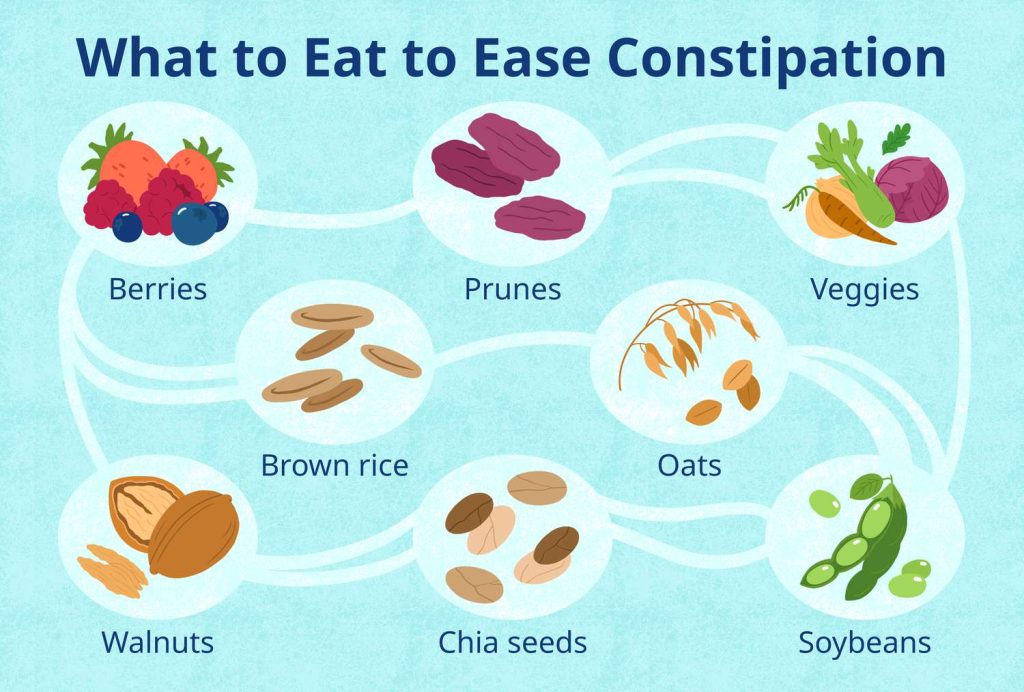
Home Remedies for Constipation:
Constipation is a common problem that affects people of all ages. It is characterized by infrequent bowel movements, hard stools, and difficulty passing stool. Constipation can be caused by a variety of factors, including dehydration, low fiber intake, lack of exercise, and certain medications.
There are many home remedies that can help relieve constipation. These remedies are safe and effective for most people, and they can be used in addition to other treatments, such as over-the-counter laxatives.
Here are some of the most effective home remedies for constipation:
Drink Plenty of Fluids: Water, juice, and other fluids help keep stool soft and easy to pass. Aim to drink eight glasses of fluids per day.
Eat a High-Fiber Diet: Fiber adds bulk to stool and helps it move through the intestines more easily. Good sources of fiber include fruits, vegetables, whole grains, and legumes.
Get Regular Exercise: Exercise helps to keep the digestive system healthy and regular. Aim for at least 30 minutes of moderate-intensity exercise most days of the week.
Take a Warm Bath or Shower: The heat from a warm bath or shower can help relax the muscles in the intestines and make it easier to pass stool.
Massage Your Abdomen: Massaging your abdomen can help to stimulate the bowels and promote bowel movement. Gently massage your abdomen in a circular motion for 5-10 minutes.
Use a Stool Softener: Stool softeners help to make stool softer and easier to pass. They are available over the counter.
Take a Laxative: Laxatives help to increase the movement of stool through the intestines. They are available over-the-counter and by prescription.
Here are some additional tips for preventing constipation:
- Go to the bathroom as soon as you feel the urge to poop.
- Avoid sitting for long periods of time.
- Get up and move around every 30-60 minutes.
- Don’t strain when you’re trying to poop.
If you’re taking medication, talk to your doctor about whether it could be causing constipation.
Surgical Treatment for Constipation
There are several different types of surgical treatment for constipation. The type of surgery that is best for you will depend on the underlying cause of your constipation and your individual medical history.
Some of the most common types of surgical treatment for constipation include:
- Colectomy: This surgery involves removing part or all of the colon. It is typically used for people with severe slow transit constipation.
- Rectopexy: This surgery involves tightening the muscles in the rectum. It is typically used for people with outlet obstruction constipation.
- Sigmoid Resection: This surgery involves removing a portion of the sigmoid colon. It is typically used for people with severe constipation caused by a narrowing of the sigmoid colon.
- Anal Fissure Surgery: This surgery involves repairing a tear in the lining of the anus. It is typically used for people with chronic anal fissures that are not responding to other treatments.
- Haemorrhoidectomy: This surgery involves removing hemorrhoids. Hemorrhoids are swollen veins in the anus or rectum. They can cause pain, bleeding, and difficulty passing stool.
Risks and Complications of Surgical Treatment for Constipation
Like any surgery, there are risks and complications associated with surgical treatment for constipation. These risks include:
- Bleeding
- Infection
- Pain
- Incontinence
- Stricture (narrowing of the colon)
- Fistula (abnormal connection between two organs)
Recovery from surgical treatment for constipation:
The recovery time from surgical treatment for constipation varies depending on the type of surgery that is performed. In general, you can expect to stay in the hospital for a few days after surgery. You will need to take it easy for several weeks after surgery and avoid strenuous activity.
Constipation Treatment Prices in Turkey
Turkey has managed to announce its name to the world with its investments and studies in the field of health. Especially the latest technological devices used in diagnosis and treatment procedures have been a beacon of hope for many diseases. However, there has been an increase in health tourism in Türkiye.
- Hospitals are large, clean, spacious, and fully equipped in terms of technological equipment.
- Turkish doctors are specialized, successful, and skilled in their fields.
- Nurses and carers are friendly and compassionate.
- Finding answers to the questions asked quickly and accurately.
- Patience and understanding of all staff, including the intermediary company dealing with the patient.
- Turkey offers holiday opportunities with its natural and historical beauties.
- Easy transportation.
- Diagnosis, treatment, accommodation, eating, drinking, dressing, and holiday needs can be met at affordable prices.
Such situations are shown among the reasons for preference. We can see that patients and their relatives who want to come to Turkey are doing research on Constipation Treatment Prices in Turkey. However, it would not be right to give clear price information at this stage. Many factors such as the type of disease, stage, diagnosis process, treatment process, and stay in Türkiye affect the price issue. If you want to get more detailed price information, you can contact us. In addition, if you come to Turkey for treatment through us, we can facilitate your visa application process with the invitation letter sent by us to the consulate.

Vimfay International Health Services